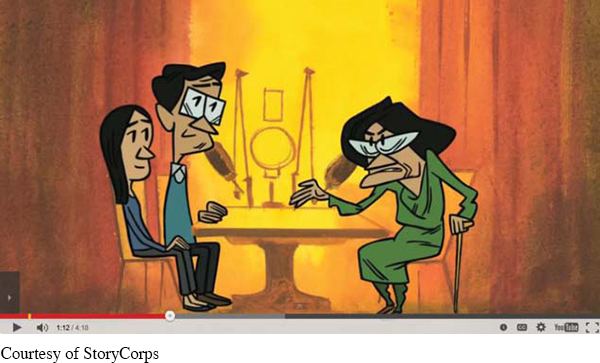100.4 Information Interviewing
A-
You might conduct information interviews for a variety of reasons: talking to an expert as research for a speech, or reaching out to a local nonprofit as part of a service-
When asked about her life, Kay Wang didn’t want to share many details.2 But as her son and granddaughter prodded her, she told tales of her adventures. Born and raised in China, she admits to being a disobedient child who often lied to cut class and spend time with her boyfriends. After moving to the United States, her escapades continued. She worked as a detective for Bloomingdale’s department store, catching shoplifters—
2 Information about Kay Wang from http:/
A-
How do we know all this about Kay? Her family took her to a StoryCorps booth, where they could interview her and preserve the stories she told. StoryCorps is a nonprofit organization with permanent and mobile recording booths throughout the United States (http:/
StoryCorps encourages friends, family members, coworkers, and romantic partners to interview each other. The goal of these conversations is to share and record the stories that participants consider important. To help them do that, StoryCorps provides participants with a trained facilitator who offers guidance on the types of questions to ask. Participants also receive instruction on how to listen, show respect to their interview partner, and take notes. Completed interviews are archived at the American Folklife Center at the Library of Congress. Some are even featured on NPR’s Morning Edition or turned into animated shorts for the StoryCorps Web site.
Whether you’re conducting an interview for StoryCorps or for your own interests, you will get the most out of an information interview if you carefully prepare for and manage it, like Kay Wang’s family did.
Through an animated version of Kay Wang’s interview that StoryCorps created, you can hear the stories and memories that Kay shared with her son and granddaughter. Both the audio and animated copies of the interview provide her family with a lasting record of her life and allow the rest of us a glimpse at her feisty spirit. You can watch the animation of Kay’s interview online at http:/
